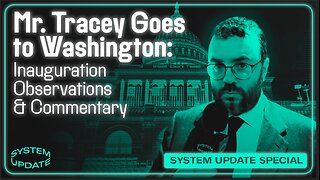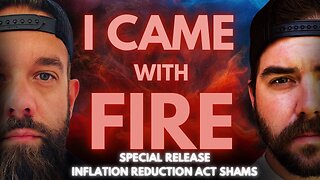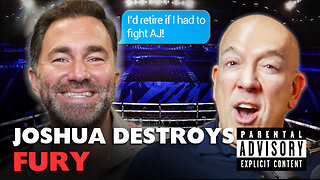Premium Only Content

The SECRET to Treat Chronic PAIN?
Explore the intersection of chronic pain, mindfulness, and self-discovery in this thought-provoking podcast. Don Hunter, a psychotherapist with 40 years of experience, shares his personal story, emphasizing the importance of acceptance, meditation, and breaking free from the cycle of suffering.
Purchase Don’s Book “Chronic Pain” My Journey Here - https://bit.ly/3r90nP0
🔗FOLLOW
▶Web - https://startswithme.ca
▶YouTube - https://goo.gl/P4L9hH
🎧 PODCAST
▶ Apple - https://goo.gl/tkZKgh
▶ Spotify - https://goo.gl/iabccZ
▶ Amazon - https://amzn.to/3uHiFFG
▶ Web - https://startswithme.ca/mentalhealthpodcast/
Questions - hello@startswithme.ca
In the book you kind of describe there's one example or a couple examples you give of sort of bad treatment, but you were started to seek everything you possibly could write to help yourself. And within that, I what I was looking for was to get rid of it completely. I wanted to find something that would get rid of it completely. And when I went in to all these things and I'd get a little feel a little better from them, and I just said, No, it's not enough. Not enough. That was the big problem. I just want to read this because it's so funny that you just described this thing about going to a shiatsu therapist who said who explained that my headaches were caused by tight muscle knots in my neck and back, which would require deep tissue work. The pain from this work was unbearable. Is it supposed to hurt that much? I asked. Absolutely, he said. And your experience of the pain confirms that it is a deep tissue problem. I never went back for another shiatsu session. What was funny? And so as you sort of describe to the big problem was that you were trying to get rid of the pain. And maybe can you kind of talk about that? Because that's obviously at the core of most, I assume, most chronic conditions, but in particular, chronic pain and as you describe a lot. And then one of the chapters, Sex is into the Abyss. So I think as you were trying to get everything to stop it, you kind of got worse and worse. And then and it's that it got really worse when unfortunately, when I started on the narcotics and for the first six months I was on the narcotics, I felt great. The pain wasn't gone completely, but it was down low enough that I actually was feeling happy. Also, partly from the narcotics, I suppose. Right. But but also and I. And I lost weight, which I was happy about. And that first six months was, was great. So I was hooked into the fact that, that the narcotics were really helpful and I was worried about addiction. So I had a conversation with my pain specialists and about the addiction process. And the fact is, one of them said to me, listen, you have you have you go away for the summer. I went to camp for the summers. You go away for the summer and you take, you know, 25 batches of 200 milligram of fentanyl with you. And you don't overuse and you have a bottle of morphine pills at your bedside and you don't take more than you're supposed to. So we don't think you're addicted. We think you're just dependent on the medication for pain relief. So that resonated with me.
So I kept going and then the pain started to get worse and worse in spite of going up higher on the medications, trying different ones. I think I've tried pretty much everything there is. And it was all not working and it was actually making things worse. And that was my new pain specialist decided that that's what's happening is the medication, you need to come off it.
So he was telling me for the and my wife was telling me each other two years prior to when I went to camp, the medical withdrawal unit, that I needed to get off the medications and by that time was okay.
And by that time I was in bed most of the time at home, but I was still functioning. Right. And I think is so common for people. And clearly there is a overprescribing of these medications in the world. The painkillers in particular.
-
 1:27:06
1:27:06
Glenn Greenwald
6 hours agoMr. Tracey Goes To Washington: Inauguration Observations, Interviews & Commentary | SYSTEM UPDATE #393
109K41 -
 52:01
52:01
Tucker Carlson
10 hours agoNew York Mayor Eric Adams Sounds a Lot Like a Trump Voter
178K162 -
 2:47:25
2:47:25
Right Side Broadcasting Network
9 hours agoLIVE REPLAY: President Donald J. Trump Holds First Press Briefing Since Inauguration - 1/21/25
221K185 -

Man in America
8 hours agoTrump UNLEASHED! Dismantling the Deep State and Restoring America
22.3K16 -
 27:22
27:22
I_Came_With_Fire_Podcast
10 hours ago🔥SPECIAL RELEASE🔥 Inflation Reduction Act: American Seniors Get SLAMMED!!
9.52K3 -
 6:25:28
6:25:28
vivafrei
8 hours agoD.C. Gulag Jan. 6 Prisoners Release Watch!
179K86 -
 1:49:14
1:49:14
Redacted News
7 hours agoTrump is Back! Congress Uncovers New Biden Crimes One Day After He Leaves D.C. | Redacted
164K226 -
 2:09:53
2:09:53
Benny Johnson
8 hours ago🚨President Trump LIVE Right Now Making MASSIVE Announcement At White House News Conference
277K327 -
 2:04:10
2:04:10
Revenge of the Cis
8 hours agoEpisode 1433: Retribution
117K18 -
 1:42:50
1:42:50
The Criminal Connection Podcast
12 hours ago $0.07 earnedEddie Hearn talks JOSHUA vs FURY, Working With Frank Warren & The Truth About Turki Alalshikh!
56.2K2